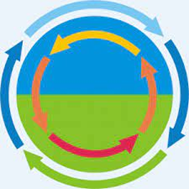
Duration
January 2022 to December 2025
Contact
Dr. Olaf Stein
Building 14.14 / Room 4009
+49 2461/61-2370
E-MailDETECT
Disentangling the Role of Land Use and Water Management
Several continental regions on Earth are getting wetter, while others are literally ‘drying out’, not only in terms of precipitation but also measured by the increase or decrease in surface water, water stored in soils and plant root zones, and groundwater. Contrary to common belief, observations also do not support a simple dry-gets-dryer and wet-gets-wetter logic. Instead, the observed trends in, e.g. precipitation, soil moisture, water storage, or flood discharge, deviate considerably from such a simplified logic. These changes in the weather balance’s spatial patterns have, it is hypothesized, created and amplified imbalances that lead to excessive drying or wetting in more remote regions. We propose to test this hypothesis for a single region of continental size in the 1st phase (Europe/Eurasia) and in later phases to evaluate the transferability of our approach for regions with different environmental conditions. We propose to develop evidence-based sustainability criteria for land and water use activities.
To address these objectives, DETECT has gathered researchers in four clusters. These clusters will (A) improve the representation of physical processes and processes that drive land use (6 projects), (B) improve the climate data record with geodetic and remote sensing techniques (4 projects), (C) establish a central modelling system including the data assimilation framework (5 projects), and (D) structure diagnostics to test the CRC’s central hypothesis (7 projects). High-Performance Computing will obviously play an important role for DETECT, which is why we decided to establish a separate service project (Z04) dedicated to HPC support. Linking the DETECT diverse data sets so that they can be efficiently reused is an active area of research and requires a large-scale data and computing infrastructure. JSC – SDL Climate Sciences is leading this activity wihin project Z03 (Data infrastructure and services).
DETECT has been established at the University of Bonn (01/2022-12/2025), funded by DFG. Partners are Universities of Cologne, and Göttingen as well as DWD and Forschungszentrum Jülich with its institutes IBG-3 and JSC. Scientific coordinator is Prof. Jürgen Kusche ( University of Bonn, Institute of Geodesy and Geoinformation http://www.igg.uni-bonn.de/ )

